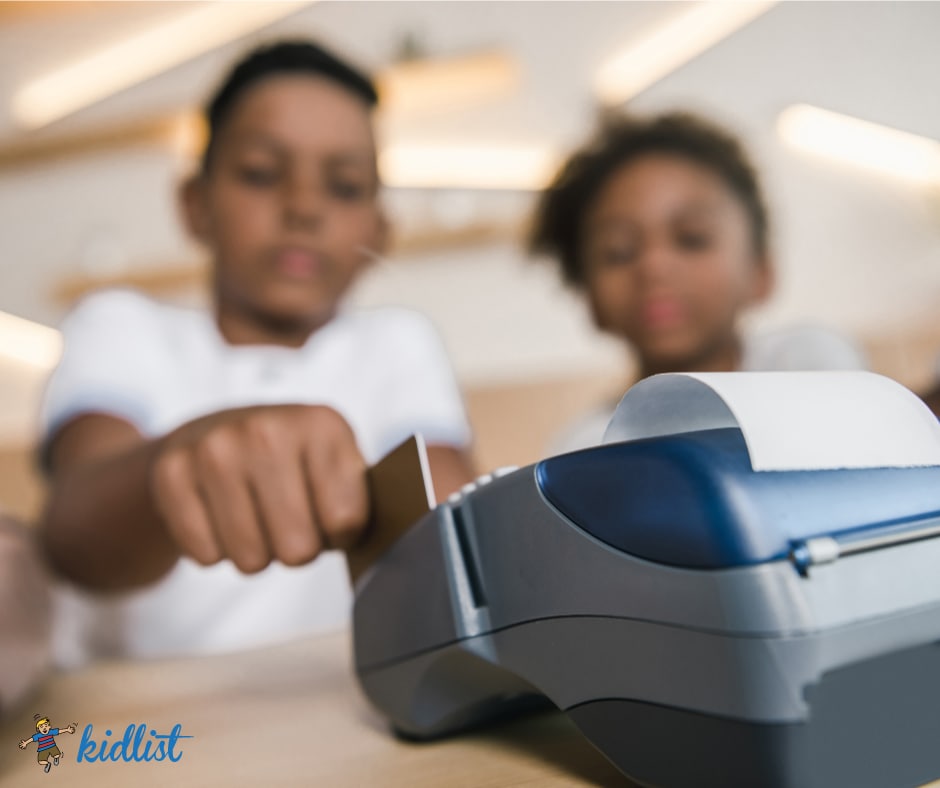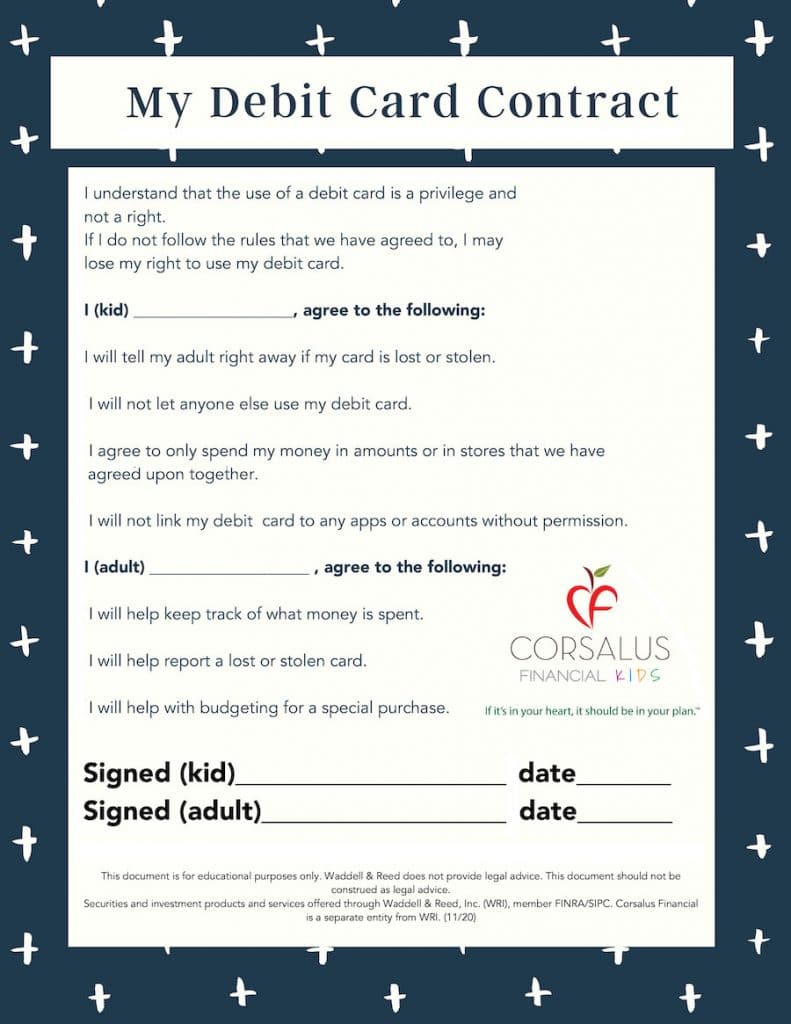Kidlist welcomes Jason Dobrzynski, CFP®, RLP®, CMFC® and Maralynn Kearney, MBA of Corsalus Financial as guest contributors. We love their mission to teach kids about money! While piggy banks are traditional ways for saving allowances and birthday money, many older children also want the accessibility and convenience of a debit card. A huge thank you to Corsalus Financial for helping us make a informed decisions on what will work best for our families!

Both Jason and Maralynn are local residents, financial advisors, and parents (Jason of a 3 year-old daughter and infant son, and Maralynn of three teenagers), and Corsalus Financial is a wonderful Kidlist sponsor – we are honored that they offered to share their wisdom. You can connect with Jason and Maralynn on LinkedIn and Corsalus Financial on Facebook.
Is My Child Ready for a Debit Card?
While this is a personal consideration for each child, we suggest you start talking about money with children when they are very young so they begin to understand money’s concepts and purpose. In July we shared suggestions on how to get started talking with your kids about money.
As children begin to spend time independently of their family, having a source of money available for their needs often becomes important. Having control of independent spending money, through a debit card or prepaid card, is a prime opportunity for your child to have real-life experience managing their money. With these cards, many offer parental control as to how much can be spent per transaction per store, or create separate portions of their accounts for spending, saving, or for donations.
Things for your family to consider include your child’s independence, level of responsibility, impulse control, and their ability to respond appropriately to peer pressure. Talk with your kids about the choices you made when you had when you opened your first bank account. What would you have done differently?

How should I get started?
First, consider the two options for debit cards to see which will work best for your family.
Prepaid cards typically have some fees associated with them and are linked to major credit card companies. The ones listed below are attached to apps to allow you easier access to reload and track your child’s spending. The cards tend to have fewer fraud and billing protections than cards attached to a bank account. Some parents prefer to have the prepaid cards completely separate from their checking accounts.
The other option is a child’s checking account with a linked debit card from a bank. Typically, this would be a bank where the parent already holds a checking or savings account. These cards also have many of the “fun” additions that prepaid cards offer, like being able to send money for chores completed and offer apps for kids to review their purchases, and an app to check their account balance. If the child attempts to charge something greater than what is available in their account, the transaction will be cancelled, just as it would for a prepaid card; it will not be drawn from a parent’s account.
Do You Need a Debit Card Contract?
Consider writing out your expectations in the form of a contract to be signed by child and parents. It doesn’t have to be complicated, but having established boundaries will minimize the chance for miscommunication regarding the use of the debit card. You may want to note that your child has a responsibility to let you know immediately if the card is stolen or missing.
Discuss what expectations you have for your child to manage their money. Do you want your child to use a checkbook register to write down where the money has been spent? Does your child have permission to use the card for online shopping? Make a clear decision about whether they are allowed to connect the card to any online accounts, payment services or apps to order food.
When your expectations for your child’s use of the debit card are clear, you are setting them up for a positive experience that will build their financial confidence. Check out the Debit Card Contract that we’ve created just for you! Click on the image below for the printable to open in a new window.
Stand-alone Debit Cards
These prepaid cards are typically held by credit card companies. They often incur fees for usage, but most do not need to be associated to a parent’s bank account to be opened. Most link to apps that are kid-friendly and have easy access for parents to reload. Prepaid cards have limited fraud protection compared to a bank-associated cards.
Greenlight (Mastercard) is $4.99 per month after the first month free trial. Includes up to five kids, no age minimum.
Greenlight is controlled by an app that allows you to send your child a weekly allowance as well as bonus money for completing extra chores. You can choose what stores they are allowed to use the card at and set spending limits.
FamZoo (Mastercard) has two kind of accounts, Prepaid and IOU. Both have $5.99 recurring fees unless bulk paid for a set number of months. Card purchase fees are $2/card. Free ATM visits and card reloads.
Kids under 13 will have “on-behalf” cards where the parent is the legal cardholder. Kids age 13 and up (and their parents) will need to go through an easy verification process to be approved. And all FamZoo accounts must have at least one parent as an account cardholder.
BusyKid (Visa) is $19.99 per year for one card; additional $7.99 for each extra card; ages 5-16.
You use the BusyKid prepaid card to give your child money. You can simply assign an amount, or you can tie the money to completed chores with the BusyKid chore app. The BusyKid chore app also allows your kid to give to charity and invest.
gohenry (Mastercard) is $3.99 per child per month; ages 6-18.
A parent account must be set up to control the child accounts. You can decide where the card can be used, and can set savings goals for your child and see where and when they spend their money.
Children’s Debit Cards from Banks
Many banks offer savings or checking accounts with optional debit cards. Most require an adult’s account to be linked, but will not allow the child’s debit card usage to affect the parent’s account. Some also offer options to add funds to your child’s account for chores and limit spending via an app as well. Contact your bank for more information.
If you’d like to talk to us about kids and money, we’d welcome an opportunity to speak with you!
Corsalus Financial
1220 Kensington Rd Suite 200
Oak Brook, IL 60523
(630) 320-5055
More articles and tips from Corsalus Financial:
- Ways of Teaching Kids to Give Back
- How to Talk to your Kids about Money
- Emergency Savings and a Financial Plan
- Your Guide to Illinois College Saving
Jason Dobrzynski and Maralynn Kearney are Financial Advisors offering securities and investment products and services through Waddell & Reed, Inc. (WRI), member FINRA/SIPC. Corsalus Financial is a separate entity from WRI.
This article is meant to be general, and it is not a recommendation of any kind. The cards referenced and any links provided are for informational and educational purposes only. When you access unaffiliated third-party sites, you are assuming total responsibility and risk for your use of the site.
Information presented has been obtained or derived from sources believed to be reliable and current; however, we cannot guarantee the sources’ accuracy or completeness.
Waddell & Reed is not affiliated with Kidlist or any of the debit cards listed. (11/20)















